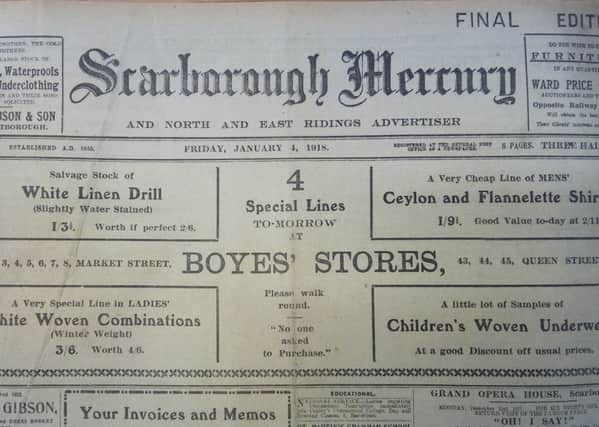1918 court: Youth summoned for not holding his horse


The chief constable said he had felt he must take proceedings in that case because of the danger which existed when horses were left at such a distance that the person in charge had no control over them at night time.
The youth had no one with him to take charge of the horse while he was delivering the goods, and perhaps the Bench, when their worships had heard the circumstances, would be able to make a representation to the owners of vehicles, generally, through the press as to the desirability of not sending out horses and vehicles during the hours of darkness.
It was a dangerous custom in these times.
Advertisement
Hide AdAdvertisement
Hide AdIn this case, the van was a laundry one, and it was left outside the Equestrian Hotel.
The youth had to go through to the kitchen, write out a receipt, and it was some minutes before he could return. Meantime the horse got tired of waiting and went off.
He, the chief, did not know where it might have gone to, probably to the stable, but a boy named Stanley Newlove saw it alone in the street, and seeing the name of the laundry on the van he quite properly took the horse home - to its proper stable.
The horse was walking leisurely along when the witness (Stanley Newlove) saw it.
Advertisement
Hide AdAdvertisement
Hide AdWilliam Storry, of 57, St John’s Road, the owner of the horse, had been seen, and he said the animal, which he had had some seven years, was a very quiet one, and would stand if it was left alone.
Owing to the shortage of labour he (Storry) could not send anyone to take charge of the horse whilst the goods were being delivered.
There was, said the chief, a shortage of labour, but tradesmen might notify customers that goods would not be delivered during the hours of darkness.
He, the chief, asked for leniency for the youth and if any fine was imposed he suggested that the employer ought to pay for it.
Advertisement
Hide AdAdvertisement
Hide AdReplying to the clerk, the chief said that Newlove saw the horse in Castle Road; it had got as far as Aberdeen Walk.
It was walking, and Newlove seeing the reins hanging down, and no one in charge took it to the laundry stable.
The defendant, asked if he had anything to stay, stated that at public houses no one answered the doors, and he had to go in.
It was just before nine when he went to the Equestrian, at turning-out time.
A lot of soldiers were coming out, making a noise.
Advertisement
Hide AdAdvertisement
Hide AdThe chairman expressed appreciation of the youth’s position, and said that the contribution of 2s 6d, which they intended to impose towards the costs, should be paid by the employer.
The magistrates thought that tradesmen generally should have goods delivered as little as possible after it became dark. After it got dark it became dangerous in every way.
They might ask customers to be as reasonable as possible, so that goods might be delivered during the day.
It was only a question, in many cases, of thoughtlessness, when people insisted on goods being delivered after dark.
The case was therefore dismissed under the Probation of Offenders’ Act, 2s 6d to be paid towards the costs.